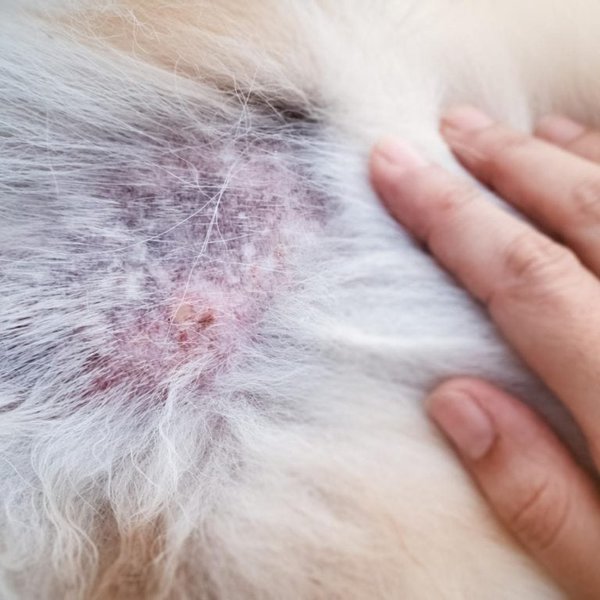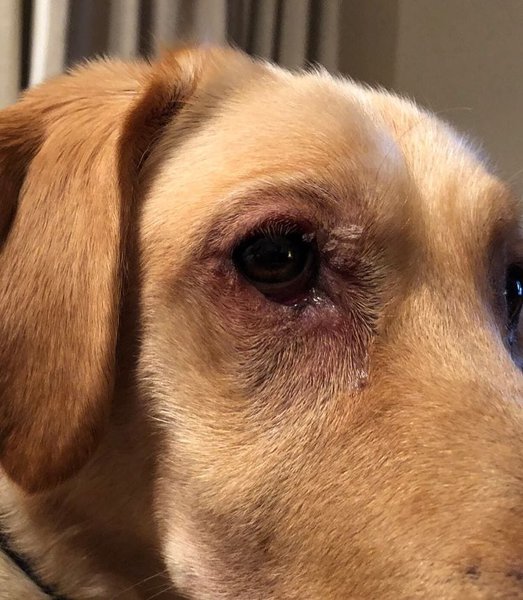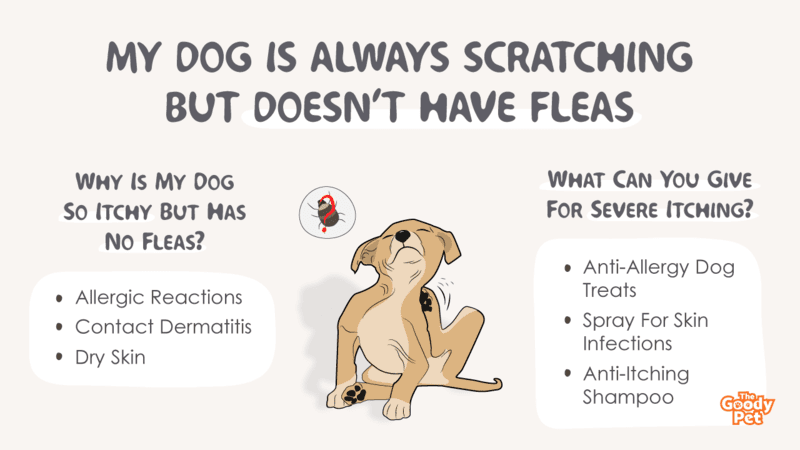There are a number of potential causes for your dog’s scratching, but fleas are not likely to be the problem. If your dog is consistently scratching, it could be a sign of allergies, dry skin, or another medical condition.
The most likely culprit is an allergy. Allergies can be caused by a number of things, including certain foods, pollen, dust, and even cleaning products. Infections of the skin or ears can lead to scratching as well.
We’ll take a look at some of the most common causes of excessive scratching in dogs and how you can get them relief.
Why Is My Dog So Itchy But Has No Fleas?
Other than fleas, compulsive scratching in dogs can be caused by three main reasons. Here is a simple breakdown of each of them:
Allergic Reactions
Allergic reactions will cause significant skin irritation for your four-legged furry friend. This eventually leads to scratching and itching. Allergic reactions are normally caused by the dog food the pooch is eating.
Environmental factors may also trigger these reactions. Mold and pollen in particular are very risky. Dogs also deal with seasonal allergies each year, especially during springtime.
Contact Dermatitis

Contact dermatitis is a skin disorder in dogs, characterized by hypersensitivity, inflammation, and significant skin irritation. The condition is caused by allergens and chemical substances in the environment. Contact dermatitis affects all dogs, but some breeds are more susceptible than others. Common symptoms include severe itching, skin inflammation, soreness, and scaling.
Dry Skin
Your four-legged canine friend will also scratch and itch due to dry skin. Skin dryness in dogs is also caused by environmental factors. However, dogs that live in areas with low humidity are extremely susceptible to dry skin.
The good news is that dry skin is easier to diagnose. Common symptoms include increased flakes of dandruff in the pooch’s undercoat. Extreme cases of skin dryness will also lead to cracked and tough skin, inflammation, and hair loss.
To emphasize, just because your dog is scratching does not always mean it’s suffering from these conditions. A certain level of scratching is normal. You should only get worried when the pooch is scratching uncontrollably all the time.
How Do I Know If My Dog Is Allergic To His Food? Does My Dog Have A Skin Infection?

It is important to distinguish between food allergies and food intolerance. Food allergies occur when your furry canine friend reacts to certain substances in the food it’s eating. Food intolerance on the other hand occurs when the poor pooch is unable to properly digest food.
Common Allergens In Dog Food
Before we discuss common signs of allergic food reactions in dogs, let’s, first of all, give you a list of allergens commonly found in dog food. Typically, foods rich in protein pose the highest risk of allergies. We are talking about things like beef, pork, chicken, lamb, eggs, or fish.
Some dogs are also very sensitive to dairy products, while others may experience allergic reactions to whole grains like wheat and soy. Nonetheless, allergic reactions vary significantly from dog to dog. The most important thing is to keep track of what your pooch is eating and determine which foods, if any, cause the allergies.
Signs Of Food Allergy In Dogs
Several signs of food allergy in canines will manifest themselves in the short term. First, your pooch will experience itching due to skin irritation or inflammation. Paw biting and obsessive licking are also very common. You may also want to inspect your pooch’s ears for chronic inflammation.
Skin Infections
Skin infections are often caused by untreated skin allergies. However, infections can also be caused by bacteria. Common signs of skin infections include:
- Patchy fur loss
- Skin peeling and crusting
- Moisture on the skin
- Inflammation and increased skin redness
- Excessive discomfort and pain
- The appearance of lesions, filled with pus, in several parts of the pooch’s skin
How Do I Know If My Dog Has Fleas Or Just Dry Skin?
Before we get to the signs of a flea infestation, it is important to note that symptoms of flea and dry skin are notoriously similar. For instance, your four-legged furry friend will scratch compulsively if they have fleas and do the same as a result of dry skin.
So, don’t jump to any conclusion. Instead, do a closer inspection just to be sure what you are dealing with. Here are a few tips that will help you detect fleas in your pooch;
- Use a flea comb to look out for flea dirt. These are small black particles that are normally found on the dog’s fur and skin.
- It is also possible to spot full-grown fleas on your pooch’s skin, especially if the infestation is severe.
- Inspect your house for fleas too. If the dog has fleas, chances are these pesky pests have already spread all over your furniture and carpets.
Signs Of Dry Skin
There are several unique signs of dry skin in dogs. Some of these signs, like excessive itching, could be a reaction to flea bites. But if you can’t spot fleas or flea dirt, then you are dealing with a different skin issue. For dry skin, check out for the following symptoms
- Patches of hair loss on your dog’s body
- Too much dandruff
- Skin flaking
- Unpleasant odors
- Pimples and inflammation
- Scaling
What Can You Give A Dog For Severe Itching?
Compulsive itching makes your pooch so uncomfortable and irritable. The great news is that some readily available effective remedies can address the issue. We analyzed lots of itching remedies in the market and came up with three of the best solutions that you can start using today. Here they are:
Anti-Allergy Dog Treats
Let’s start with the Pawfectchow Allergy Relief for Dogs. This allergy relief is formulated to address both internal and external symptoms of allergies, including compulsive itching. The chews are 100% natural, too, and perfectly suited for dogs of all ages and breeds. The anti-allergy treats also come packed with immune-boosting ingredients and are so delicious your dog will love them.
Spray For Skin Infections
Make sure to also check out the Curaseb Antiseptic Chlorhexidine Spray. It is very effective in treating skin infections in dogs and cats. The anti-itch dog spray also provides instant relief from itching. It is loaded with aloe and vitamin E, both of which are very effective in nourishing your pooch’s skin. The spray is also great for treating dry skin and redness.
Anti-Itching Shampoo
Finally, we wrap up with the Vet’s Best Allergy Itch Relief Dog Shampoo. Scented with refreshing citrus and lavender, the shampoo offers immediate relief for itchy skin. It is 100% natural, too, and comes loaded with beneficial essential oils that will help manage fleas and other pests. Its soothing effects help to wash away allergens from your dog’s skin without leaving any dryness.
Can Dogs Cause Itching In Humans?
Yes, dogs can transfer itching to their owners. If your four-legged furry friend is suffering from bacterial skin infections, it will easily pass them to you. Skin infections in dogs caused by fungus or yeast are also transferable to humans.
As a result, it is common for dog owners to feel skin irritations when their dogs are suffering from itching and skin infections. Additionally, your four-legged furry friend may be a carrier of skin-irritating pests like fleas. Flea bites in humans are known to cause skin redness and itching too.
How To Protect Yourself?

You can protect yourself against transferable dog skin conditions in several ways. First, have the dog treated as fast as possible. Using homemade remedies or over-the-counter solutions is highly recommended too.
Secondly, always wash your hands with soap after handling your dog. If you have kids, make sure they develop this routine as well. Although we love spending time playing with our furry buddies, the last thing we want is to put ourselves at any risk of disease. Something as simple as washing your hands goes a long way.
Proper hygiene is also vital for the pooch. Make sure you bathe your dog with shampoo regularly. The same also applies to the dog house or where the pooch sleeps. It has to be cleaned and disinfected with safe, natural products regularly. Finally, ensure your dog is up to date with all the vaccines.
Related Questions
Can You Give A Dog Benadryl To Stop Itching?
Yes, Benadryl is a very good medication to use for itching in dogs. It also provides relief for mild and moderate allergies. The most important thing is to get the dosage right. Generally, 1 milligram for every pound of body weight is considered standard but be sure to talk it out with your vet.
Can I Put Hydrocortisone Cream On My Dog? Absolutely, you can. Hydrocortisone Cream contains Hydrocortisone acetate, a substance that will help break the cycle of itching for your poor pooch. The cream will also calm inflamed skin. It is a handy product to have on your cabinet if you own a super-sensitive dog.
Can I Put Aloe On My Dog?
Aloe, or aloe vera, is generally healthy for your dog’s skin. But you don’t want to apply it directly to your pooch. Use it as a complementary treatment. For example, you can mix it up with water and apply it on affected patches of skin for relief.





